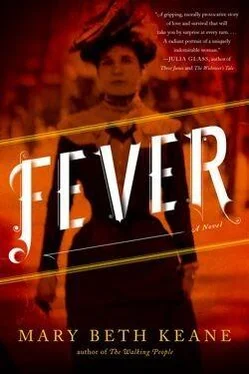“Jesus Mercy”
— Mary Mallon’s headstone
St. Raymond’s Cemetery
Bronx, New York
The day began with sour milk and got worse. You were too quick, Mary scolded herself when the milk was returned to the kitchen in its porcelain jug with a message from Mr. Kirkenbauer to take better care. He was tired, Mary knew, from the child crying all night, and moaning, and asking to be rocked. And he was worried. They’d tried to spare him — Mary, Mrs. Kirkenbauer, and the nanny had taken shifts with the boy, but the boy’s room was just across the hall from his parents’, and the boards of the new house creaked and whined, and the women sometimes forgot to keep their voices lowered, and finally Mr. Kirkenbauer had emerged from the master bedroom in his nightshirt to ask what could be done. “Give him to me,” he’d said to Mary at the start of her shift, just as the bleary-eyed nanny hurried back to her small room at the rear of the house.
At two o’clock in the morning none of them cared about being seen in their nightclothes. She’d handed the boy to his father, a baby really, still a baby; they called him a boy because he’d started calling himself a boy, but it wasn’t true just yet, in six more months, perhaps, yes, but not yet, not with those fat legs and cheeks, that unsteady, tottering step, the fact that he still loved a lap more than any chair. Mr. Kirkenbauer had observed in a whisper, “He’s very warm.” He put his pursed lips against the boy’s forehead. Then he handed the child back to Mary and sat on the chair in the corner as she rocked the boy and told him all the wonderful things the morning would bring. Did he want to see a sailboat? Mary asked. Did he want to throw rocks in the river? Did he want a warm bun straight from the oven? But the child only stared, and cried, and wrapped his hot arms around Mary’s neck, tight, like they were at sea, and she his buoy, and he was terrified of losing his grip.
Mary tried not to make too much of the milk being sent back, of the expression on the butler’s face that was meant to mime Mr. Kirkenbauer’s, and she reminded herself that Mr. Kirkenbauer was exhausted when he complained about the milk, they all were, and who knew what tone he’d really used when he gave the message to the butler, who had struck Mary from her first day as a nervous type. Mrs. Kirkenbauer was still upstairs, sleeping or trying to, and the nanny was giving the boy a cool bath, his third in as many hours. A light rash had bloomed across his chest, and in the very early hours of the morning Mrs. Kirkenbauer had suggested a plaster of bread and milk, or running to a neighbor for linseed oil, but Mary had said no, she’d seen the rash before, there was nothing for it but rest and trying to get the boy to eat something. The Kirkenbauers weren’t the richest family Mary had ever worked for. Their kitchen was not as modern as most where Mary had cooked. But they were kind people, they paid her good wages, and other than a few specific requests from Mrs. Kirkenbauer, Mary had leave to do the shopping and serve whatever she liked.
Sometimes, after supper, Mrs. Kirkenbauer pitched in with the scrubbing, which Mary was baffled to discover she didn’t mind. A mistress who hung around the kitchen with her hands in pots and pans and pantry would normally be intolerable, and if Mary had been told this was the way it was going to be she never would have taken the job in the first place, but now that she was there, and had gotten to know them, she was surprised to find that she didn’t mind a bit. Mrs. Kirkenbauer had three sisters in Philadelphia and said she missed female company more than anything. Mary continually tried to take the temperature of her mistress’s ease, so that perhaps, one day, she’d work up the nerve to ask her a question. Had she always been a person of means, or only when she married Mr. Kirkenbauer? The Kirkenbauers didn’t know many people in Dobbs Ferry yet, which meant they seldom entertained, which meant Mary rarely had to cook for more than the three in the family and the staff and herself. The house looked at the Hudson, and on Sundays when the weather was fine they had picnics on the riverbank and always invited any among the servants who had not traveled home to their own families for the day.
Mary took the jug of milk the butler extended toward her. “Is it really gone?” she asked as she lifted it to her nose. “It’s gone,” she confirmed, clenching her teeth against the urge to vomit. She walked quickly to the narrow back door to throw it out. There was a faint sucking sound as the milk pulled away from the jug, and Mary watched it fly through the air as a solid thing until it landed, about six feet away, a white lump in the wet grass. In a few seconds the foul smell filled up the space between the lump and the doorway where Mary was still standing. She fetched the kettle, just boiled, and hurried outside to stand over the wet lump with her head swiveled away as she poured the steaming water over it. She turned back just in time to watch it disappear in curdled rivers, get caught up in the green blades, soak into the ground.
“Is that the end of it?” The butler asked, worried, casting his eyes toward the long hall that led back to the dining room.
“There’s more. There’s plenty,” Mary said. “That was only what I was saving for bread, but I forgot, last night, when I made the bread I used the buttermilk. I was too quick. The ice is low. I broke off big pieces to put in the child’s bath, and what’s left of the block needs more sawdust. They need a right icebox here is what they need. They need one of those zinc-lined jobs. I put the good milk in the back of the box, but this morning—” Mary thought she heard a footstep in the hall. She raised a finger to the butler to wait.
“This morning?” he said. They were alone. The recently cut timbers of the house creaked under the weight of the night’s lashing rain, and now, even with every single window open and every door propped wide, the air was thick and hot. It settled on everything and all morning the collar of Mary’s dress had felt like a noose.
“Nothing.” It was no use explaining. Mr. Kirkenbauer was waiting in the dining room with his bowl of dry blueberries and his coffee still black. “Here,” Mary said, putting a fresh jug onto the butler’s salver. She’d have to make new bread for lunch to make up for the mistake, even though there was nearly a full loaf on the counter from yesterday, even though that loaf would be fine with a little toasting, a pat of butter spread on top.
“How’s the child this morning?” the butler asked. His room was on the third floor, and thanks to that distance he had gotten a full night’s sleep.
“No better, no worse. Poor thing.”
The butler nodded. “About the milk, Mary. It’s only to be expected in this heat. That’s probably why the child feels feverish. I feel feverish myself.”
Not all butlers were so kind, but it seemed to work from one extreme to another in every house she had cooked for. Either the staff was a team that signaled one another with silences or a clandestine nod, or they were competitors, each one trying to smudge out the others’ good work.
• • •
Mary had been with the Kirkenbauers for only a month when the boy got sick, and later, when she looked back, she struggled to remember exactly what circumstances had brought her there, all the way up to Dobbs Ferry, when there were plenty of open positions in Manhattan. Alfred was still finding good work in 1899. He was still getting a clean shave every other day, earning Friday wages he handed over to Mary to pay a portion of their rent, their food. The agency had often wanted to send her to New Jersey, or Connecticut, or over to the western side of the Hudson where the trains didn’t reach, but she always refused unless they were short-term jobs that paid too much to decline, and ultimately those families usually went with a lesser cook, someone who couldn’t get a job with a Manhattan family. But Mary could get a job with a Manhattan family, so why had she agreed to go up there to Dobbs Ferry to a woman who was not a proper mistress but half-servant herself, the way she leaned in to the pot to be scrubbed, the way she cast her eye around the kitchen for grease. Maybe it was because when she met Mrs. Kirkenbauer at the agency there was something about the woman she liked. She didn’t ask Mary if she was a Christian. She didn’t ask if she was married or planning on getting married. She asked only about her cooking, and when the woman talked about food, about the responsibility of getting meals together every day of the week, she seemed to be speaking from experience.
Читать дальше












